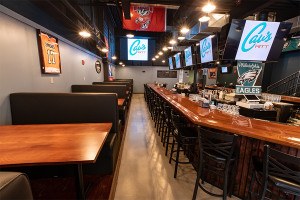Bastia: A Mediterranean Marvel in Fishtown
Tyler Akin’s new Fishtown restaurant takes diners from the shores of Corsica to the top of Philly’s dining scene.
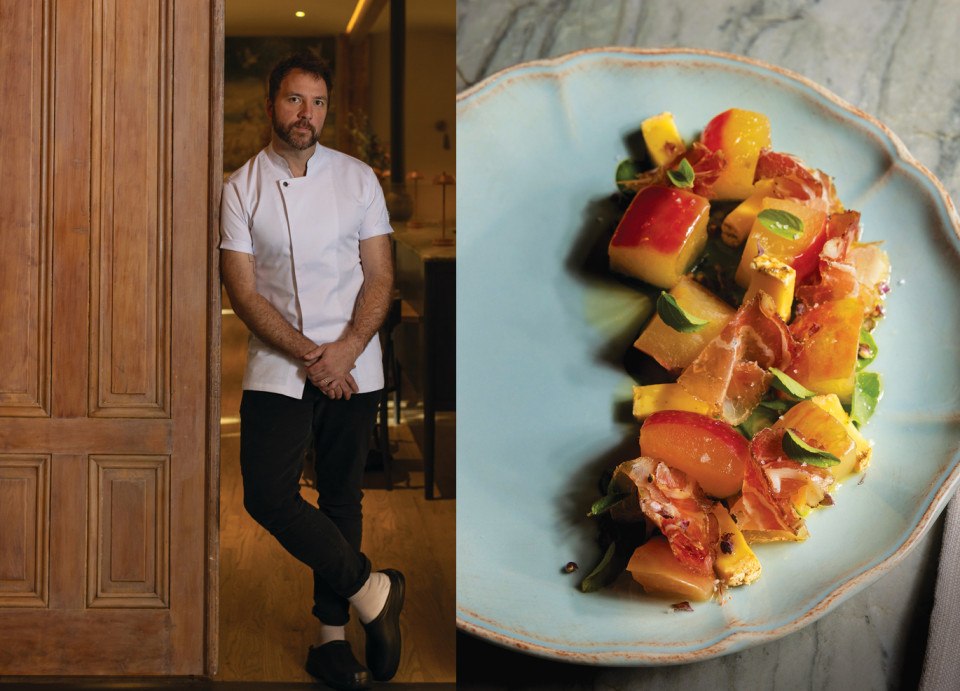
From left: Tyler Akin; a plate of honeycrisp apples with Perrystead’s Atlantis cheese, lonzu, tarragon, and honey at Bastia. / Photography by Courtney Apple
There’s this scene in Ratatouille where Remy the rat is trying to show his brother (Emile, also a rat) that he can do better than eating garbage all day. Remy gives Emile a grape and a piece of cheese. He tells Emile to close his eyes. To focus on the flavors of each thing. Emile does what Remy says. He eats the cheese, then the grape, and, on screen, we see some little sparks of color to represent the experience of truly tasting something. But then he eats both together, and, for the first time ever, fireworks explode in his head — these two flavors together, creating something greater than they could ever be on their own. A new sensation that Emile has never experienced before.
That’s what it’s like eating at Bastia.
On a warm autumn night I’m sitting in chef Tyler Akin’s understated dining room just off the lobby of the boutique Hotel Anna & Bel in Fishtown. My daughter is with me, smart and beautiful and home from college on a short break, and we both say the same thing at the same time. We’re sharing a plate of Honeycrisp apples soaked in spiced honey, the plate dotted with folds of lonzu and cubes of seawater-washed Perrystead Atlantis, and she looks up and says, “It’s just like that scene in Ratatouille — ”
“When Ratatouille gives the grapes and cheese to his brother. It is.”
“The rat’s name is not Ratatouille. You know that.”
“I do know that.”
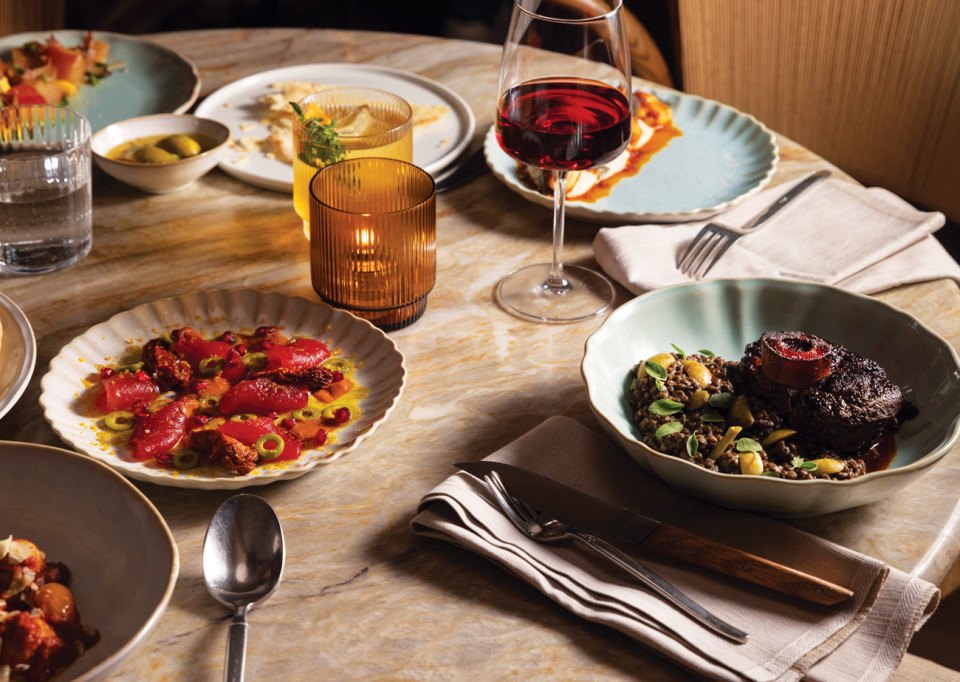
A spread of seasonal dishes
The plate is so simple. So perfect. It is emblematic of nothing about cooking and everything about being a chef — the choices made, the careful balancing of flavors, the knowledge of what must go with what to balance sweet against salt against savory against spice. Fireworks. Every time we take a bite.
At our corner banquette, under soft lights, we ate shaved bluefin tuna with bottarga, sundried tomato, and little green rounds of sliced olive, and pasta cupped like seashells dressed in a wisp of lemon butter sauce and tossed with chunks of Maine lobster. There were grapes and burrata served with hazelnuts and dark chocolate, split langoustines marked on the grill, and skate cheeks over polenta with a brown butter crisp touched with the smoky sweetness and strange vegetable softness of Jimmy Nardello peppers, and all of it bled together like the dreams you have just before waking — hyper-real but blurred around the edges, sweet and wistful both at the same time.
I drank cold gin and told my girl she had to try the ricotta dumplings I didn’t even remember ordering because I was envious of her lobster. They were Corsican-style storzapretti — fork-soft but firm, threaded with chard, rich without being overwhelming — in a sharp arrabbiata punctuated with salty guanciale.
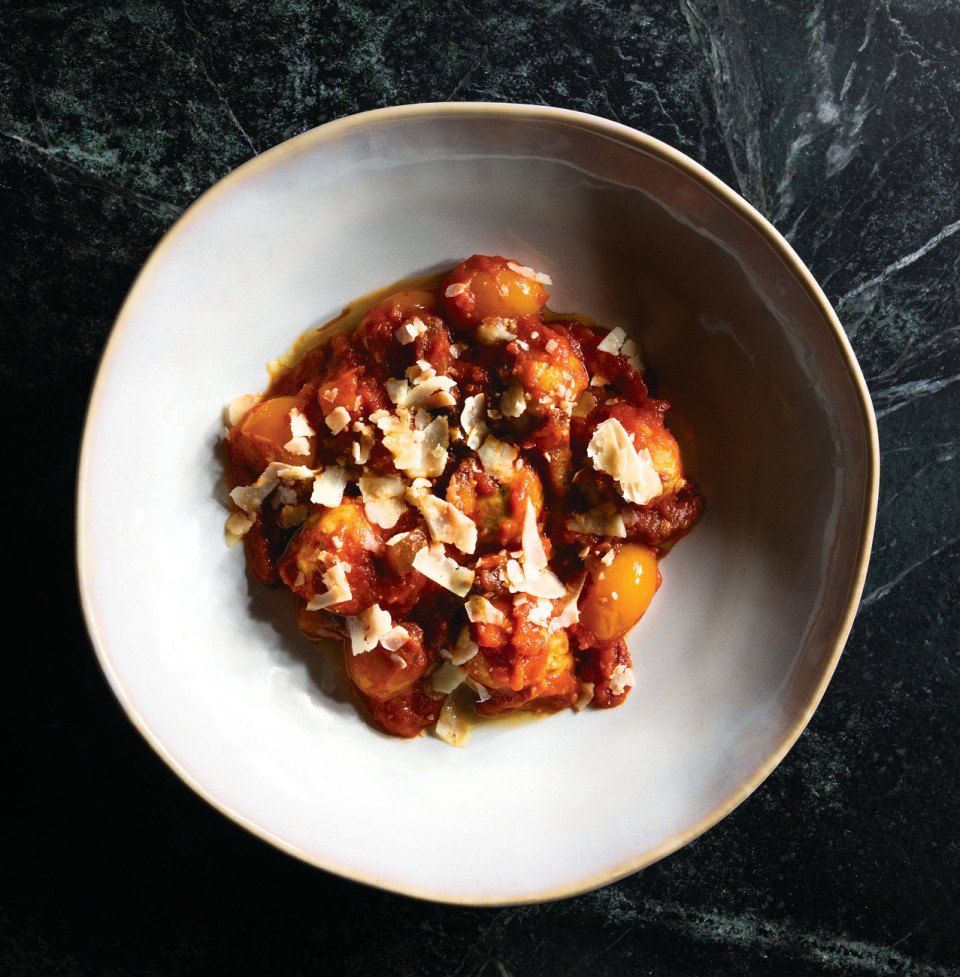
Storzapretti at Bastia
“It’s good?”
“So good,” I told her, pushing the bowl across the table. Then, when her hands were full, I stole some of her lobster.
Next was herbed pork belly with roasted new potatoes over Sardinian flatbread called pane carasau. It was perfectly trimmed and fanned, roasted with wild maquis herbs, the potatoes split and cooked hard so the insides steamed. It would’ve been the highlight of almost any other table in the city. Here it was just the thing we pushed aside before descending like starving wolves on the best swordfish I’ve had, possibly ever. Brochettes, on skewers, grill-charred but meltingly soft on the tongue. Served with black rice, with a walnut pesto that could’ve made shoe leather sing, with a smear of gently spiced labneh that added just the slightest touch of acid, there was nothing about the dish that wasn’t perfect. Like the egg raviolo they used to do at Res Ipsa after the sun set on Walnut Street, made to split and bleed yolk into a warm brown butter sauce, it was a dish I knew I could eat one bite of and remember for 20 years.
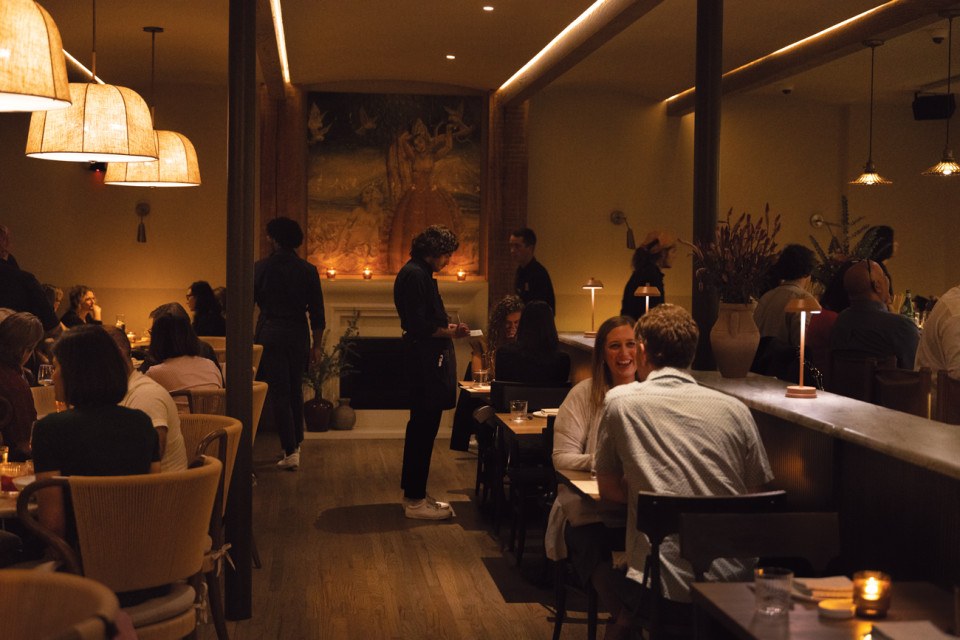
Scenes from Bastia’s dining room
“I’m sorry,” I said to my daughter, sitting across from me.
“For what?”
“Because you’re probably never going to have swordfish this good again in your life.”
And she looked at me strangely, tilted her head, scowled, and asked me, “Dad, why do you have to ruin everything?”
4 Stars — Come from anywhere in America
Rating Key
0 stars: stay away
★: come if there are no other options
★★: come if you’re in the neighborhood
★★★: come from anywhere in Philly
★★★★: come from anywhere in America
Published as “Basking in Bastia” in the December 2024/January 2025 issue of Philadelphia magazine.

